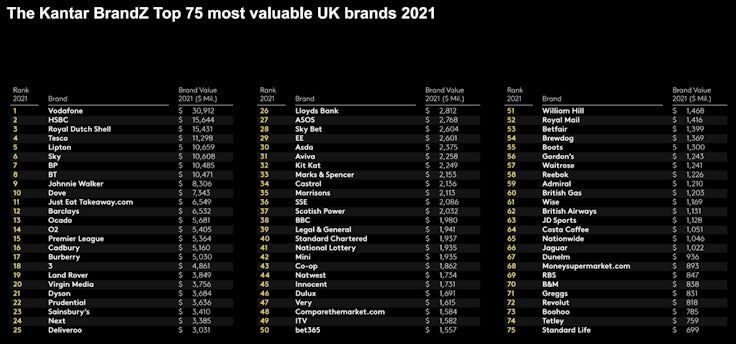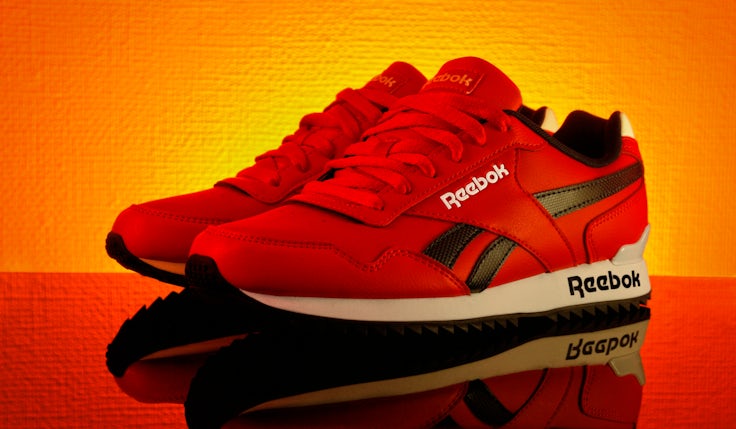Revealed: The UK’s top 75 most valuable brands
The latest BrandZ ranking of the UK’s strongest brands shows marketing has never been more important as a value driver, with those that had been investing in marketing prior to the pandemic bouncing back at a faster rate.
 The value of the UK’s strongest brands has not only recovered since the onset of the pandemic but is now accelerating at a faster pace than pre-Covid, according to the latest BrandZ analysis by Kantar.
The value of the UK’s strongest brands has not only recovered since the onset of the pandemic but is now accelerating at a faster pace than pre-Covid, according to the latest BrandZ analysis by Kantar.
The total value of the UK’s top 75 brands has increased by 22% since 2020. This is well ahead of the 6% global economic growth rate forecast in March by the International Monetary Fund, and far better than the FTSE 100, which is yet to recover to pre-pandemic levels (down 13% as of 7 September).
After plummeting 13% from $263bn in 2019 to $229bn last year, the overall value of the top 75 UK brands has jumped to $279bn in 2021, which is 6% higher than two years ago. After several years of decline, it’s also positive to see the overall value of the top 75 increase for the first time, rising 3% compared to 2018 when the list was first created.
Martin Guerrieria, global head of research at BrandZ, suggests this indicates “genuine green shoots of growth”, not just a rebound to the declines experienced last year.
“The FTSE still hasn’t recovered to pre-pandemic and yet the UK brands with stronger brand equity have surpassed their prior pandemic levels. It shows that in the UK specifically, brand equity is certainly a worthwhile investment to make. We know it works. Those with better consumer relationships ultimately perform better and are better protected.”
He says it demonstrates that “brand is becoming increasingly important as a value driver”, which presents a huge opportunity for marketers.
“It certainly feels like the marketing department, brand and insights teams have more opportunity than ever to actually add value to their businesses,” he says. But he warns it’s crucial to maintain investment, measure the impact of that investment, identify the right KPIs and measure progress against them.
The four growth pillars that connect the UK’s strongest brands
Strong brands recover faster
The data shows brands that had been investing in marketing and establishing “meaningful connections” prior to the pandemic hitting were in a better position in terms of recovery.
“That’s a really key point,” Guerrieria says. “What we’ve seen by looking across the breadth of the BrandZ database, not just the UK but other markets, is that actually if we look at the brands that have grown since the pandemic began versus those that haven’t, in terms of their comparative strength of equity, those that have grown were more meaningfully different to begin with.
“It suggests those brands and businesses that invested in their marketing efforts, in boosting brand equity, in boosting their relationships with consumers in advance of the pandemic, has stood them in good stead.”

While Vodafone ($30.9bn), HSBC ($15.6bn) and Shell ($15.4bn) retain their positions in the top three spots for 2021, Tesco ($11.3bn) has leapfrogged four brands to jump into 4th place, after seeing its brand value rise 33% over the past year.
The rest of the top 10 is made up of Lipton ($10.7bn), Sky ($10.6bn), BP ($10.5bn), BT (£10.5bn), Johnnie Walker ($8.3bn) and Dove ($7.3bn).
“There’s no doubt that in our global top 100 we are seeing fewer UK brands present – Vodafone is now the sole UK brand represented in the global list,” Guerrieria says. “But that’s not to say it has been an unmitigated disaster. A lot of that is because the pace of the global top 100 has seen real acceleration this year, and partly why we’re framing this as a big opportunity for brand building.”
Amazon retains crown as world’s most valuable brand
Global stage
When looking at the growth of brand value among UK brands over the past year compared to other markets, the rate of recovery is strong. Looking at the top 30 brands across all countries Kantar analyses for BrandZ, the UK has the second highest growth rate (21%) behind China (54%).
It is followed by the USA (17%), Italy (11%), Germany (6%) and France (5%), all of which are back in growth.
At the other end of the spectrum, Spain (-15%), the Netherlands (-12%), Japan (-8%), Canada (-6%), India (-4%) and South Africa (-3%) are all still in decline.
While the growth of the UK’s top 75 brands far exceeds the global economic forecast, it is still way behind the growth rate of the world’s 100 most valuable brands, which collectively grew 44% this year.
Fastest risers
Perhaps unsurprisingly given the upheaval of the past 18 months, this year’s fastest risers are in necessity categories like logistics, online delivery and apparel.
Royal Mail’s brand value has increased by 83% pushing it to 52 in the ranking and making it the UK’s fastest riser this year. Ocado is not far behind, rising 72% to 13, followed by Asos (up 65% to 27) and Deliveroo (up 57% to 25).
There has also been a rise in brands that offer some form of entertainment or release for people. Gambling brands, for example, which can “be an escape for some people”, saw a big boost. Betfair’s brand value increased by 45%, putting it at 53 in the ranking, while William Hill is now at 51 having increased its brand value by 41%. Both are among the top 10 fastest risers for 2021.
Meanwhile, Sky Bet has entered the ranking for the first time, jumping straight in at 28. The Premier League is another new entry, joining the ranking at 15.

Elsewhere, reflecting the changing needs of consumers over the course of the pandemic and the fact money has been tight for many, budget retailers have also seen a boost. JD Sports (63), which Kantar classes in this category, and B&M Bargains (70) join the top 75 for the first time.
Greggs is another new entry for 2021, joining the ranking at 71. The brand had been steadily gaining ground ahead of the pandemic, with Greggs praising marketing’s “key role” in increasing profits in March 2020.
But this momentum was severely impacted when Covid struck. Greggs posted a 30.5% drop in sales to £811.3m in 2020, resulting in its first ever pre-tax loss of £13.7m, a significant decline from the £108.3m profit it made in 2019.
However, the bakery chain underlined the important role marketing plays when it revealed its annual results this March, as it outlined plans to increase focus on digital innovations, customer loyalty and product development.
Guerrieria says Greggs is a great example of a brand that has innovated and adapted to customers’ changing needs, while also improving its advertising in terms of perceived strength. In 2017 its advertising had a score of 97 (below average), but this increased to 103 in 2020.
“We have 100 as an average and Greggs is now seen as better than the average UK brand in terms of the quality of its content,” he explains. “So yes it is spending, but it is spending in areas that are high quality and communicating the things it knows work for its target audience, like convenience and range. It talks about those things in its comms, and its digital comms are very strong as well.
“Plus it has a CEO who is actively talking about the role marketing has played in the journey and the commitment to keeping that spend at a relatively high level going forward.”
This focus is already bearing fruit for Greggs, which reported a strong recovery in the first half following the reopening of non-essential retail in April, with the second quarter of 2021 “exceeding expectations” by delivering like-for-like sales growth compared to the same period in 2019.
Total sales for the first six months of the year reached £546m, driving an underlying pre-tax profit of £55.5m. Greggs says it now expects full-year profit to be “slightly” ahead of previous expectations, leading its share price to reach an all-time high in July.

About the BrandZ ranking
Kantar BrandZ™ is the global currency when assessing brand value, quantifying the contribution of brands to business’ financial performance. Kantar’s annual global and local brand valuation rankings combine rigorously analysed financial data, with extensive brand equity research. Since 1998, BrandZ has shared brand-building insights with business leaders based on interviews with 4 million consumers.
The study includes the opinions of over 150,000 UK consumers, with the UK brands in the list all meeting these eligibility criteria:
- The brand must originally have been created in the UK and be owned by an enterprise listed on the London Stock Exchange / or a recognized stock exchange.
- The brand must originally have been created in the UK and be owned by an enterprise listed on the London Stock Exchange / or a recognized stock exchange.
- English unicorn brands have their most recent valuation publicly available.







